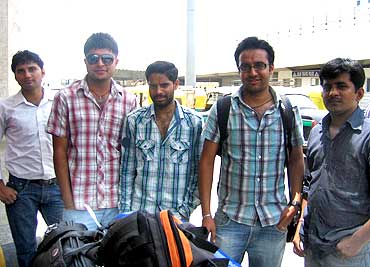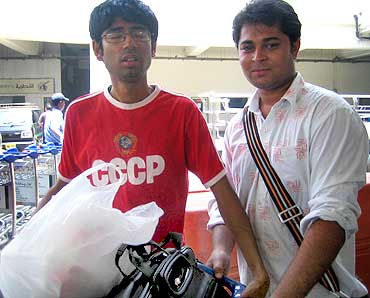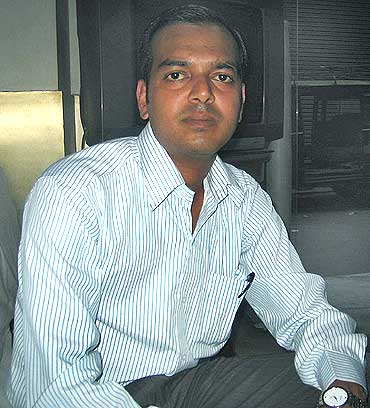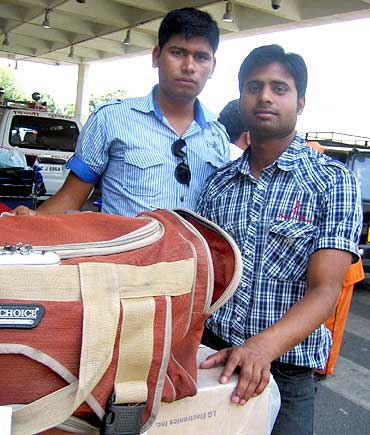
The relief at finally being home is visible in the eyes of the 70 Indian students studying in Kyrgyzstan, who were caught in the ethnic clashes in the cities of Osh and Jalalabad, before being evacuated and sent back to New Delhi on Tuesday morning.
The students were evacuated from the cities of Osh and Jalalabad, which saw the worst of the ethnic violence, and sent to Kyrgyzstan's capital Bishkek a week ago by the Indian embassy.
But the gory visuals of blood and bullets continue to haunt these students.
"The law and order of the city was out of gear. People ran helter-skelter to save their lives. Houses in the neighbourhood were set on fire and streets bore witness to the daily rampage involving blood and tears," recalled Tripta Gupta, a student studying in Osh.
The political climate at Osh has been extremely volatile since the ouster of President Kurmanbek Bakiyev in April. The condition worsened further in the first week of June when clashes between two ethnic groups (Kyrgyz and the minority Uzbek community) intensified.
Kyrgyzstan's interim President Rosa Otunbayeva recently admitted that the toll due to the ethnic violence could be as high as 2,000. The Kyrgyzstan government has declared a state of emergency in the southern city of Osh and other areas till June 25.
Reportage and photographs: Anisha Ralhan in New Delhi

Amrit Das, an Indian student from Jalalabad, says, "An armed mob used to knock on every door, sometimes even late at night, inquiring about the Uzbeks. Those who objected to their entry were shot on the spot."
A Pakistani student lost his life in a similar episode of violence, he says. "He was shot dead, along with the Uzbeks, at their residence," recalled Das.
At least 15 students were stranded in Osh colony, one of the most troubled areas in the city, while other students spread across the city had to be evacuated with the help of special armed forces.
"We happened to reside in the middle of areas dominated by the two communities. They would fire shots at each other till midnight, causing immense panic and fear," Shaheer Khan, the official coordinator of the Osh State University of Medical Faculty in Kyrgyzstan, told rediff.com.

He remembers horrific scenes of dead bodies being kicked around across the two rival camps.
But Dr Khan took the onus upon himself to ensure the safety of every single Indian student, when authorities remained unperturbed initially. He stayed back in Osh till the second batch of Indian students arrived safely from Jalalabad.
"The group from Jalalabad was equally tormented. There was acute food shortage in their locality as malls and shops had been burnt and ravaged," he stated.
The two groups also complained of frequent thefts and burglary. A number of students lost their cast, credit cards and other important documents which impeded their journey back home.
Though the students expressed their gratitude to the Indian embassy at Bishkek, the capital, for ensuring their safe evacuation, they lamented the lack of help while coming back to India.
"All we wanted from the Indian embassy was to arrange our trip back home. We were bereft of our belongings, our lives were completely disrupted; we were famished for days. Some of the students were physically weak and mentally agonised," recalled Dr Khan in an agitated voice.

The students had swarmed the street outside the embassy, urging the officials to make arrangements to send them back home, but the embassy curtly turned down their request.
The news about Indian authorities arranging a special flight to bring them back home was false, say the disgruntled students.
They pointed out that the Pakistan government had arranged for a special flight to ferry its students back from Bishkek.
"It was unfair of the government to withdraw support after our landing at Bishkek. How much could it have cost them to fly us back home? How could they turn deaf to our appalling condition," questioned a medical student.
He and his batch-mates were scheduled to receive their degrees by the end of June, but the chances of going back to Kyrgyzstan seem remote for these students.
"Our university might call us in September to hand over our degrees. But I'm very sure, in the current scheme of things, our convocation won't see the light of the day," says Avishkar, another student.